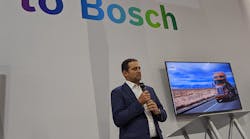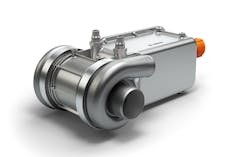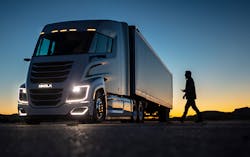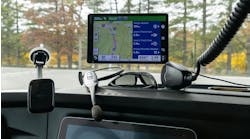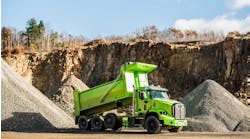Technology is the key to freight’s future, a future that Bosch is positioning itself to be a big part of in the coming years.
“We as an industry need to create technology that is for every fleet and every driver,” Jason Roycht, vice president and regional business unit leader of commercial vehicles & off-road for Bosch in North America, said during last week’s North American Commercial Vehicle Show in Atlanta.
Roycht detailed how he sees his company’s emerging technology helping the freight industry become more efficient and attract more commercial vehicle drivers. The American Trucking Associations (ATA) projects freight will increase by 25% between now and 2030, he noted during an address to the media. Revenue of that freight is expected to grow by 50% — reaching $1.6 trillion over the next decade.
“Our experience in electrification is pretty broad,” Roycht said. “Today, mostly on the passenger car side, where we are continuing to optimize internal combustion engines around the world but we’re also playing a big role in enabling hybrid-electric technology and we’re also assisting many OEMs with implementing full-electric technology.”
Bosch is also delving into new fields, he said. “Basically, our goal at Bosch is to leverage the existing infrastructure development resources we have globally to find solutions in the commercial vehicle industry and, where necessary, also develop new solutions for that industry. And the case in point I want to talk about is fuel cell.”
“It’s estimated that as much as 20% of all electric vehicles by 2030 will be fuel cell vehicles,” he said. “And I think it’s fair to say the excitement around fuel cell and hydrogen technology is really increasing in the commercial vehicle world. This used to be a small band of believers. Maybe at the last NACV, there weren’t too many people that were talking about this. But that small band of believers has now turned into a large band of implementors. And you’ll see that at the show here. You’ll see Hyundai, Peterbilt, Cummins, and many others — Bosch, Nikola — we’re all in this together.”
Roycht said that Bosch believes commercial vehicles are the best way to “scale up fuel cells. Not only fuel cells but infrastructure.”
“We’re good at a few things at Bosch and one of those things is industrialization,” he added. “And we want to take the entire breadth of experience we have around powertrain technology and bring that now to the fuel cell. In fact, I think it’s safe to say that we at Bosch believe the fuel cell industry represents an opportunity for our company in the billions of dollars. Our aim is to be a market leader in the fuel cell components and systems. To do that, we are making an investment in technologies.”
At NACV, Bosch showed off its portfolio of solutions to develop fuel cells for commercial vehicles. The Bosch portfolio includes essential components needed to implement fuel-cell technology, such as hydrogen gas injector (HGI), anode recirculation blower (ARB), electric air compressor (EAC) and fuel cell stacks.
Roycht said he can’t talk about the fuel cell future without addressing infrastructure and Bosch’s work with Nikola on its Nikola Two tractor.
“Nikola isn’t just an OEM,” he said. “They’re a company that from the beginning wanted to attack the chicken-or-the-egg problem of hydrogen with the fuel cell. You know, it’s kind of an old joke in the industry: the fuel cell is the powertrain of the future — and it always will be. But I think we’re going to talk a lot more about it a lot sooner.”
One thing that Bosch liked about Nikola is that the company didn’t only have a strategy to produce a fuel-cell truck, but it also wanted to create a hydrogen infrastructure “with readily available hydrogen, at a class-competitive price, coming from renewable energy. And if this is realized, the entire industry will benefit from it. Not only on the commercial vehicle side but also on the passenger car side.”
He said that Bosch believes in that future, which is why more than 200 Bosch engineers have been working with Nikola on its fuel cell truck. “Together with Nikola, we custom designed the fuel cell system to meet their needs for the truck,” Roycht said. “We collaborated together on one of the industry’s first dual-motor electric axles for the truck. And we’re very proud of all of this work.”
Today’s tech
Besides fuel cell technology, Bosch continues to work to finetune powertrain efficiency — from work to optimize the internal combustion engine to developing new technologies for electrification.
The new Bosch modular 700V drive can be integrated into multiple vehicle architectures. Comprised of a separate-motor-generator, an inverter, and a vehicle control unit (VCU), the solution supports various transmission formats, including inline, wheel near and electric axle. The approach, Roycht said, allows CV manufacturers to electrify already-existing vehicle platforms.
Bosch is also bringing electrification to medium-range delivery applications. The Deliver-E hybrid concept vehicle project was funded by the U.S. Department of Energy. The goal is to design and integrate an advanced dual-planetary gear transmission featuring multiple clutches that reduces fuel consumption by up to 50 percent on a real-world drive cycle.
Driver focus
The ATA projects the industry will need to hire 1.1 million new drivers over the next decade. In order to hit this number, it will take 110,000 new drivers every year. At the end of 2018, the driver shortage in the U.S. was estimated at around 60,000.
“Technology is our ally in this challenge,” Roycht said. “When we utilize new technology to enhance the driver experience, we are able to make a stronger case for recruiting and retaining drivers.”
Sensors, such as radar and video, assist drivers by providing more visibility to help prevent accidents. The Bosch portfolio of advanced driver assistance systems (ADAS) includes front and corner radar for light commercial vehicles as well as multiple-purpose cameras for both light- and heavy-duty commercial vehicles. These enable a number of safety features, like automatic emergency braking, turn assistant and blind-spot recognition.
The Bosch Servotwin is an electrohydraulic steering system that provides steering support to the driver, enhancing driving comfort and improving safety. It enables driver assistance functions, such as lane-keeping assistance, side wind compensation, and traffic jam assist. The system also provides a key building block for the rollout of automated features in the future.
Bosch is actively involved in the study of how automated technology can support the CV industry — particularly drivers — in the future. As part of a grant by the U.S. Department of Transportation to DriveOhio and the Transportation Research Center, Bosch will provide technology to help study highway truck automation and coordinated platooning.
